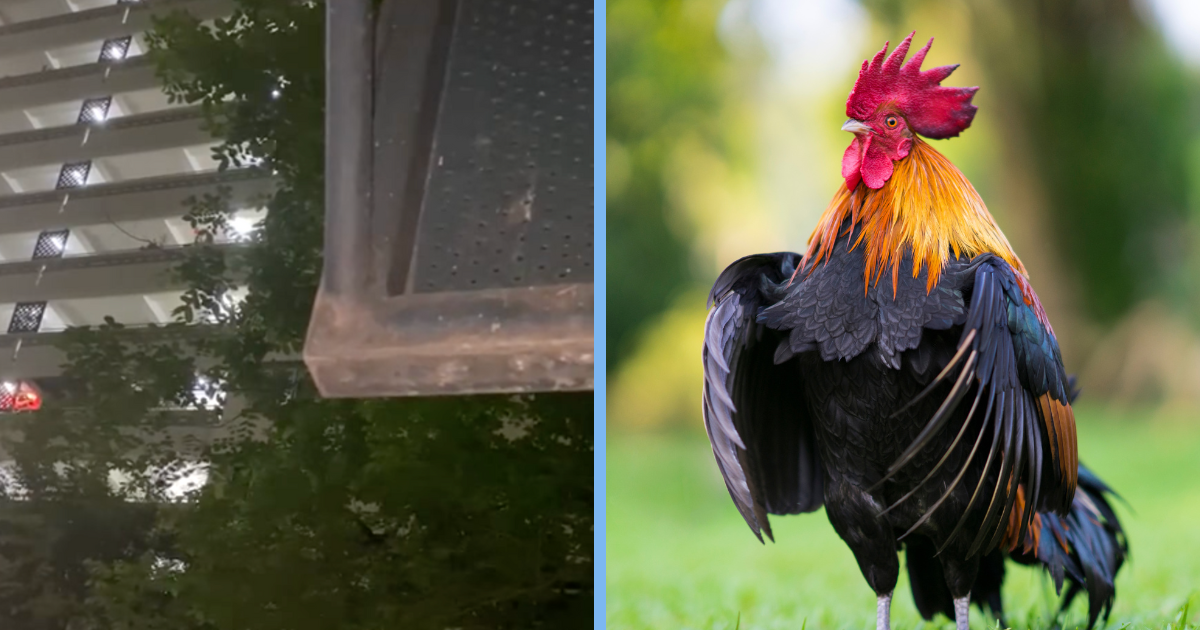Residents living near the Housing Development Board (HDB) blocks at 139 Jalan Bukit Merah have officially filed complaints with the Tanjong Pagar town council regarding the persistent noise disturbance caused by chickens in the area.
Residents have had to endure the roosters’ disruptive crowing during the early morning hours for several months.
A resident took to social media on 12 May 2023, sharing a video on Facebook that captured the extent of the noise pollution caused by the roosters in their neighbourhood.
The video highlighted the loud and incessant crowing, which has become a recurring issue in the area.
The continuous and distressing crowing has dramatically inconvenienced the residents, depriving them of sleep and leaving them drained of energy to face the day ahead.
Roosters Will Crow Incessantly At The Same Time Every Morning
Residents residing near Jalan Bukit Merah have noticed a significant rise in the population of free-roaming fowl in their neighbourhood over the past few months.
With ten chickens now currently freely wandering around the estate, coexisting with these unconfined birds has become increasingly challenging for the residents.
While it is not uncommon for chickens to be spotted in Singapore, residents in Jalan Bukit Merah can no longer tolerate the presence of these free-roaming animals and have reached their breaking point due to the noise pollution caused by the fowls’ incessant crowing.
An 83-year-old senior resident shared that among the roaming chickens, one particular rooster stands out as it vigorously crows every morning without fail, except on rainy days.
Another resident, aged 48, shared that the rooster specifically crowed around 3 am to 6 am. This started on 25 March 2023, with the rooster’s repetitive crowing depriving him of sleep for the past two weeks.
The situation is particularly distressing for this resident as he recently underwent a surgical procedure, and the noise pollution exacerbates his difficulty obtaining the necessary rest for recovery.
Noise Pollution Caused By Roosters Inconveniencing Residents
If you thought a rooster crowing around 3 am to 6 am daily already sounds bad enough, wait till you hear that the rooster even has a companion who is just as inconsiderate.
According to the resident, the rooster’s troublesome companion would fly towards the trees around the blocks, delighting the area with its melodic singing, no crowing, at dawn every day.
The relentless crowing from the roosters has become an unbearable nuisance for the residents, with even those living on higher floors unable to escape their constant vocalisations.
Furthermore, the 48-year-old resident, who has school-going children, expressed that the rooster’s crowing has adversely affected their ability to rest.
As they need to wake up at 6 am every day for school, the disrupted sleep has resulted in reduced energy levels and diminished focus throughout their school day.
Rising Population of Wild Chickens in Singapore Causing Inconveniences for Residents
Residents living in HDBs across Singapore have been facing recurring inconveniences caused by free-roaming chickens for several years.
Since 2020, the National Parks Board (NParks) has been receiving over 1,000 reports annually regarding these chickens.
The Animal Concerns Research and Education Society (ACRES) has also observed increased feedback concerning the issue of noise pollution caused by these fowls.
In 2019, nine reports rose to 14 in 2022, coming from various locations such as Marine Parade, Pasir Ris, and Ang Mo Kio.
Notably, in 2014, the Sin Ming estate experienced an influx of fowls, with 24 free-roaming chickens migrating to the estate due to nearby construction work affecting their previous habitat.
This number exceeds the current situation faced by the Jalan Bukit Merah residents.
Consequently, the Agri-Food & Veterinary Authority of Singapore (AVA) received 21 feedback reports of noise pollution caused by these roosters over three years.
Roosters naturally crow to communicate safety, establish dominance, and alert others to potential dangers within their flock.
However, this behaviour is just noise pollution to us humans, who prefer a peaceful and quiet environment and would much instead rely on our own alarm clocks rather than the irregular crowing of roosters.
As such, in 2017, the AVA had to make the decision to humanely cull the chickens after determining that relocation was not a viable option.
While the free-roaming chickens from the Sin Ming estates were observed to have migrated due to external factors, this doesn’t seem to be the case for the Jalan Bukit Merah estate.
A female resident reported witnessing some aunties feeding rice grains to the wild roosters around the estate.
Their feeding behaviour is believed to have contributed to the recent increase in the chicken population within the estate.
This suspicion is highly viable as according to Dr Yong Ding Li, an ornithologist at BirdLife International, the continuous feeding of artificial food sources like rice or junk food to these chickens can contribute to higher breeding and survival rates, increasing their population.
A sudden rise in the population of fowls would eventually necessitate culling measures due to the inability of most urban residents to tolerate the crowing caused by these chickens.
As a result, the AVA, NParks, and ACRES have advised the public against feeding these wild-roaming chickens.
Evidently, the aunties seemed to have disregarded this advice.
Fortunately, upon receiving complaints from residents, the Tanjong Pagar town council has since taken action to address the issue.
Working closely with NParks, the town council has implemented measures since 9 May 2023.
These actions may include removing human-provided food sources, educating residents about not feeding or releasing the free-ranging chickens, modifying habitats, and implementing population control strategies.
Regrettably, euthanisation of these chickens would be essential for public health and safety if the chicken population gets even higher due to an increased risk of these fowls spreading the bird flu to humans.
